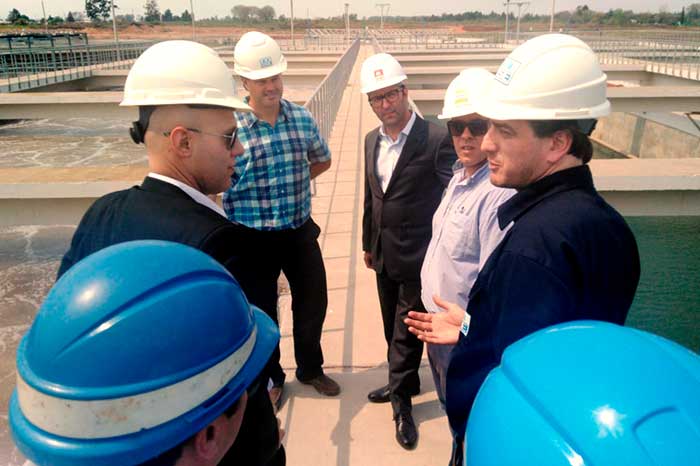New Salto Wastewater Treatment Plant
The infrastructure was built to treat wastewater generated by residents, thus minimizing pollution of the Uruguay River and improving quality of life of about 100,000 people in the area.
Obras Sanitarias del Estado (OSE), the state-owned agency responsible for the supply of drinking water in the country and sanitation services in rural Uruguay, opened a new wastewater treatment plant in Salto. The project was funded by CAF—development bank of Latin America.
This initiative is part of CAF’s OSE financing program, which aims to support the expansion and sustainable improvement of coverage, quality, efficiency and reliability of drinking water and sanitation services through of an array of prioritized investments in OSE’s Five-Year Investment Plan.
After a two-year construction period and with a USD 21-million investment, the plant aims to treat the wastewater of almost the entire city, improving the quality of life of some 100,000 residents and mitigating the pollution of the Uruguay River
“One of our main objectives at CAF is to promote sustainable development of the countries in which we operate and to implement actions aimed at improving the quality of life of the population. In this case, the new plant also has a direct impact on reduction of pollution, and thus yields environmental benefits. Therefore, we are proud to support a proposal with such a broad scope and that brings so much value to the community,” said François Borit, CAF director representative in Uruguay.
The plant’s daily average treatment capacity is a flow rate of 324 liters per second, purifying the effluents from the sewerage network and individual systems, particularly from the cesspits sanitized by vacuum trucks.
This process uses a biological treatment and disinfection with ultra violet rays. Subsequently, duly processed liquid effluents are dumped in the Uruguay River and the filtered waste is dehydrated and stabilized for final disposal.
CAF's more recent content

CAF, ECLAC, IDB and PAHO Promote Sustainable Development in the G20
The Regional Organizations of the Americas congratulate Brazil on its successful G20 Presidency, highlighting its leadership on key issues such as poverty, governance, and climate change. They also reaffirm their commitment to actions that promote equity and development in the region.
Urgent Call for Action to Safeguard Caribbean SIDS at CAF Symposium
As the global community grapples with the escalating climate crisis, Caribbean Small Island Developing States (SIDS) are running out of time to secure critical investments and support needed to strengthen their economies and protect vulnerable communities from the intensifying impacts of climate change. With the window to take decisive action rapidly shrinking, CAF - Development Bank of Latin America and the Caribbean, in partnership with the Commonwealth Secretariat and the Antigua and Barbuda High Commission, brought together key stakeholders for a symposium in London to address the critical vulnerabilities Caribbean SIDS face.




